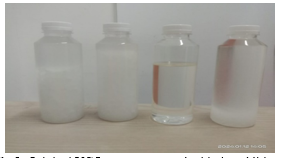The Effect of Adding Bread Yeast, Tempeh Yeast, and Tape Yeast on The Process of Making VCO from Coconut
DOI:
https://doi.org/10.26555/ijce.v2i1.665Keywords:
VCO, bread yeast, coconut oil, tape yeast, tempeh yeastAbstract
Coconut (Cocos nucifera L.) is one of Indonesia's agricultural products with potential. The most valuable coconut product is coconut oil, which can be obtained from the flesh of fresh coconuts or from copra. Virgin Coconut Oil (VCO) or pure coconut oil is the result of processing from the coconut plant in the form of a clear liquid with a distinctive coconut smell and has a long shelf life. Pure coconut oil or VCO has many benefits for body health, such as natural antibacterial, antiviral, anti-fungal and anti-protozoal properties. This study aims to compare the effect of tempe yeast, bread yeast, tape yeast, and without yeast on variations in the ratio of grated coconut and water (1: 1; 1:1,5; 1:2), on the amount of VCO produced. The experiment was carried out again and then the average volume of VCO produced by each yeast was taken. The average VCO results obtained ratio 1:1 were 209.5 ml for adding bread yeast, 153.5 ml for not using yeast, and 150.5 ml for adding tempeh yeast. Meanwhile, adding tape yeast produce the smallest yield 89 ml . Based on the ratio of grated coconut and water (1 kg: 1 liter) the optimum yield is 1:1. While the minimum yield is 1:1,5 ratio. The most VCO obtained is by adding baker's yeast to thick coconut milk in the second fermentation process. The order of highest yield based on the addition of yeast is bread yeast, tempeh yeast, and tape yeast. The yield of VCO yeast tempeh was slightly better than the yield without adding yeast. The organoleptic results and some of the VCO test results based on SNI 7783-2008 have fulfilled the specified requirements.
References
M. Paputungan, “Optimasi Penggunaan Starter dengan Metode Pancingan dan Fermentasi Berbantuan Bakteri Saccharomyces cerevisiae untuk Optimalisasi Pemisahan Lemak, Protein dan Air pada Pembuatan VCO,” Jambura J. Chem., vol. 3, no. 1, pp. 57–68, 2021, doi: 10.34312/jambchem.v3i1.10467.
G. Ayu, D. Lestari, and K. D. Cahyadi, “Analisis Mutu Minyak Kelapa ( Vco ) Yang Diperoleh Dari Buah Kelapa (Cocos nucifera L.),” Pros. Simp. Kesehat. Nasional, vol. 2, no. 1, pp. 7–12, 2023.
M. L. Pulung, R. Yogaswara, and F. R. D. N. Sianipa, “Potensi Antioksidan dan Antibakteri Virgin Coconut Oil Dari Tanaman Kelapa Asal Papua,” Chem. Prog., vol. 9, no. 2, pp. 63–69, 2016, [Online]. Available: file:///C:/Users/nurdt/Downloads/gene,+6.+Maria+Ludya+Pulung+New.pdf
N. P. P. M. S. Dewi, N. W. Bogoriani, and N. M. Suaniti, “Identifikasi Dan Karakterisasi Profil Asam Lemak Virgin Coconut Oil Dengan Penambahan Ekstrak Etanol Kunyit Putih (Curcuma zedoaria Rosc.),” Chim. Nat. Acta, vol. 7, no. 3, p. 125, 2019, doi: 10.24198/cna.v7.n3.26288.
F. H. Amrullah, M. Arini, S. Dewi, and N. Komari, “SEL DARAH MERAH AKIBAT PAPARAN LAMPU UV SECARA IN VITRO THE INFLUENCE OF VIRGIN COCONUT OIL TO HEMOLISIS RED BLOOD Pengaruh Pemberian Minyak Kelapa … ( Fitri Hadi A , dkk ),” Sains dan Terap. Kim., vol. 3, no. 2, pp. 154–163, 2009.
F. P. K. Lim, L. F. G. Bongosia, N. B. N. Yao, and L. A. Santiago, “Cytotoxic activity of the phenolic extract of virgin coconut oil on human hepatocarcinoma cells (HepG2),” Int. Food Res. J., vol. 21, no. 2, pp. 729–733, 2014.
E. Kardinasari and A. Devriany, “Phytochemical identification of Bangka origin virgin green coconut oil: Anti-inflammatory and anti-bacterial potential,” Enferm. Clin., vol. 30, pp. 171–174, 2020, doi: 10.1016/j.enfcli.2019.10.062.
Laili Nailul Muna, “Metode Pembuatan Virgin Coconut Oil,” Akfarindo, vol. 2, no. 2, pp. 19–24, 2017.
J. Pontoh, “Kualitas Virgin Coconut Oil Dari Beberapa Metode Pembuatan,” vol. 1, no. 1, pp. 60–65, 2008, doi: 10.35799/cp.1.1.2008.28.
R. Rifdah, A. Melani, and A. A. R. Intelekta, “P Pembuatan Virgin Coconut Oil (Vco) Dengan Metode Enzimatis Menggunakan Sari Bonggol Nanas,” J. Tek. Patra Akad., vol. 12, no. 02, pp. 18–25, 2021, doi: 10.52506/jtpa.v12i02.131.
N. Fatwatun, K. Chusna, and B. Pramudono, “Pembuatan Virgin Coconut Oil (Vco) : Pemecahan Emulsi Dengan Metode Ultrasonik,” J. Teknol. Kim. dan Ind., vol. 2, no. 4, pp. 184–188, 2013.
Y. C.C. Kusuma, I. D. G. Mayun Permana, and P. Timur Ina, “Pengaruh Jenis Ragi dan Lama Fermentasi terhadap Karakteristik Virgin Coconut Oil (VCO),” J. Ilmu dan Teknol. Pangan, vol. 11, no. 1, p. 74, 2022, doi: 10.24843/itepa.2022.v11.i01.p08.
V. H. Ramlan Silaban, Riza Sahala Mnullang, “Pembuatan Virgin Coconut Oil (VCO) Melalui Kombinasi Teknik Fermentasi dan Enzimatis Menggunakan Ekstrak Nenas,” J. Kim., pp. 56–64, 2014, [Online]. Available: http://digilib.unimed.ac.id/11906/
S. Fathurahmi and P. Hadi Siswanto, “Penambahan Ragi Roti Dan Lama Fermentasi Pada Proses Pengolahan Virgin Coconut Oil Addition of Baker Yeast and Fermentation Period in Virgin Coconut Oil Processing,” J. Pengolah. Pangan, vol. 5, no. 2, pp. 48–53, 2020.
L. Abudu, K. Kamaruddin, and F. Hulopi, “Pemanfaatan Ragi Tape dalam Pembuatan Virgin Coconut Oil (VCO) Melalui Teknik Fermentasi,” J. Agrohut, vol. 11, no. 2, 2020, doi: 10.51135/agh.v11i2.126.
M. L. P. Tanasale, “Aplikasi Starter Ragi Tape Terhadap Rendemen dan Mutu Virgin Coconut Oil (VCO),” Ekosains, vol. 2, no. 1, pp. 47–52, 2013, [Online]. Available: https://ejournal.unpatti.ac.id/ppr_iteminfo_lnk.php?id=420
D. F. C. Negari and C. E. Lusiani, “Karakteristik Fisik Virgin Coconut Oil (Vco) Hasil Fermentasi Menggunakan Ragi Roti Selama < 24 Jam Dengan Konsentrasi Nutrisi Yeast 4% B/V,” DISTILAT J. Teknol. Separasi, vol. 8, no. 2, pp. 359–366, 2022, doi: 10.33795/distilat.v8i2.382.
T. Rahayu, “Kualitas VCO Berdasarkan Kadar Protein, Kadar Air dan Logam Berat (Fe dan Pb) Berbagai Produk VCO (Virgin Coconut Oil) Quality,” J. Penelit. Sains Teknol., vol. 7, no. 1, pp. 1–10, 2006.
R.- -, “Studi Perbandingan Pembuatan Vco (Virgin Coconut Oil) Sistem Enzimatis Dan Pancingan Terhadap Karakteristik Minyak Kelapa Murni Yang Dihasilkan,” Indones. J. Lab., vol. 2, no. 1, p. 25, 2020, doi: 10.22146/ijl.v2i1.54196.

Downloads
Published
Issue
Section
License
Copyright (c) 2024 Alexander Maruli Tua Sinaga, Adi Permadi, Endah Sulistiawati, Totok Eka Suharto

This work is licensed under a Creative Commons Attribution-ShareAlike 4.0 International License.



